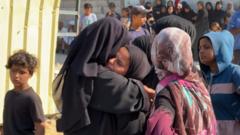The Israeli government has announced a series of humanitarian measures in response to global condemnation over the dire situation in Gaza. These include aid airdrops and a tactical pause in military operations, reflecting growing pressure from allies. Critics, including Hamas and human rights advocates, argue these steps are insufficient and merely an attempt to improve Israel's image while military operations continue.
Israel's Humanitarian Aid Response Amid Growing Gaza Crisis

Israel's Humanitarian Aid Response Amid Growing Gaza Crisis
Amid rising international scrutiny and accusations of exacerbating starvation in Gaza, Israel has unveiled new measures to address humanitarian concerns, including aid airdrops and designated corridors.
Israel has taken steps to address the mounting international outrage regarding the humanitarian crisis in Gaza by introducing a set of measures designed to enhance humanitarian access. The Israel Defense Forces (IDF) announced airdrops of essential supplies with the first drop executed during the night, followed by support from the United Arab Emirates air force for additional deliveries. Furthermore, the IDF introduced a 'tactical pause' in military operations in certain locations and pledged to create 'designated humanitarian corridors' in a bid to counteract the narrative of widespread starvation.
However, the measures have been met with skepticism from various quarters. Hamas denounced the attempts as a "deception" aimed at obscuring the realities on the ground, arguing that Israel intends to "whitewash its image." In spite of claims from Israel that it does not impede humanitarian aid to Gaza, many of its close allies, including European nations and the United Nations, have expressed concern over the restrictions that have plagued aid access.
The recent moves by Israel may signal an acknowledgment of the need for a more effective humanitarian response. Diplomatic pressure has intensified, most notably from Britain, France, and Germany, who called for immediate action to lift aid restrictions and comply with international humanitarian law.
Previously, Israel had instituted a comprehensive blockade of aid into Gaza, often with significant limitations on the content of aid convoys, and has implemented a new system of aid distribution through the 'Gaza Humanitarian Foundation' (GHF). This alternative model faces resistance from humanitarian organizations, which label it 'inhuman' and militarized. Reports indicate that over a thousand Palestinians were killed while attempting to reach the GHF locations.
Humanitarian officials have harshly criticized the methods associated with the GHF, suggesting they create an environment that exacerbates hunger and suffering. Jonathan Whittall of OCHA described the conditions in Gaza as unprecedentedly dire, emphasizing the urgent need for improved transport for aid deliveries and assurances of safety for those receiving assistance.
In defiance of international accusations, Israeli leaders, including Prime Minister Benjamin Netanyahu, have vehemently denied claims of wrongdoing and face increasing scrutiny and legal challenges from various international bodies for alleged war crimes associated with starvation tactics.
The humanitarian drops seen from aerial footage highlight a desperate attempt to alleviate suffering amidst unceasing violence. Observers note that while aerial delivery can appear beneficial, it is often a short-term and ineffective solution, unable to resolve a crisis that requires sustained, unrestricted ground access to adequately address the needs of the affected populations.
The complexities surrounding aid delivery to Gaza echo past humanitarian crises, where air delivery has been deemed necessary yet fraught with peril, complicating relief efforts further. With a significant portion of Gaza's population crammed into a small area, logistical challenges abound, complicating the distribution of aid and raising concerns about potential conflict over resources among desperate civilians.
Despite Israel's pledge to open routes for aid convoys into Gaza, the commitment to effectively meet the humanitarian needs of the population remains uncertain as the conflict continues.



















